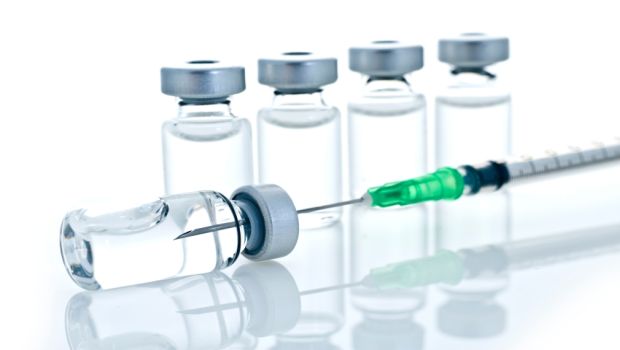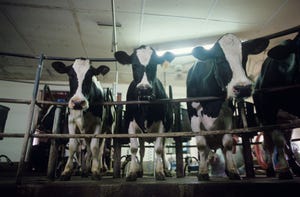USDA issues $10.2m for animal disease preparedness
APHIS awards $5.2 million for disease preparedness and response plus $5 million for animal health labs and moves forward on animal vaccine bank.

The U.S. Department of Agriculture’s Animal & Plant Health Inspection Service (APHIS) awarded $ 10.2 million to support disease prevention and emergency response training and exercise projects as well as targeted projects to enhance laboratory diagnostic capability as part of its efforts called for in the 2018 farm bill. The agency is also moving forward with developing the National Animal Vaccine & Veterinary Countermeasures Bank (NAVVCB).
“USDA has always worked best when it collaborates with states, universities and farmers and ranchers out in the field,” USDA undersecretary for marketing and regulatory programs Greg Ibach said. “Our farm bill programs allow us to continue to strengthen these vital partnerships. Working together, we can further improve our ability to protect U.S. animal health and respond to animal disease events. At the same time, we will continue to ensure we have an effective insurance policy in the extremely rare chance of an outbreak of certain high-consequence foreign animal diseases like foot and mouth disease” (FMD).
The 2018 farm bill provided funding for these programs as part of an overall strategy to help prevent animal pests and diseases from entering the U.S. and to reduce the spread and impact of potential disease incursions.
APHIS is awarding $5.2 million through the National Animal Disease Preparedness & Response Program. Projects funded by this program will advance the capabilities, capacity and readiness of the nation’s animal agriculture sector responders through training and exercises. They will be led by state animal health authorities and land-grant universities in 25 states. The projects will address training and exercise priorities in all major livestock industries and all regions of the U.S., with a third of the projects affecting national or regional levels.
APHIS is awarding $5 million through the National Animal Health Laboratory Network (NAHLN). Network-funded projects will be led by NAHLN laboratories representing 19 states. Collectively, they address test method development and validation, improving electronic transmission of data, increasing biosafety and biosecurity in laboratories and enhancing emergency preparedness. These efforts will help us enhance NAHLN's diagnostic capability, APHIS said.
APHIS is continuing its efforts to stand up the NAVVCB. The first priority of the NAVVCB is to increase the U.S. stockpile of FMD vaccines. On Oct. 11, APHIS closed its 30-day sources sought notice for FMD vaccines with a total of seven responses, which the agency reviewed as part of development of its acquisition strategy. In its latest action, APHIS is issuing a request for proposals and plans to have the initial FMD vaccine contracts in place by the end of second quarter of fiscal 2020. The agency's target goal is to invest $15-30 million on vaccines by the end of 2020. The vaccine bank will allow APHIS to stockpile animal vaccines and other related products to serve as an effective insurance policy in the rare chance of an outbreak of certain high-consequence foreign animal diseases like FMD.
In its weekly "Capital Update," the National Pork Producers Council (NPPC) added that USDA, which has prescribed vaccination for dealing with an FMD outbreak, currently does not have access to enough vaccine to avoid devastating economic consequences to the U.S. economy should an outbreak occur. “These initiatives are critically important to pork producers in their efforts to prevent the introduction of foreign animal diseases and maintain the high level of health in the U.S. swine herd. NPPC has been advocating for USDA to move as quickly as possible to establish an FMD vaccine bank and is grateful to APHIS for its efforts to begin implementation of these programs,” NPPC said.
Beth Breeding, vice president of communications and marketing for the National Turkey Federation (NTF), said NTF was a leading voice in calling for the development and funding of these programs in the 2018 farm bill and is encouraged by USDA’s progress in implementing them.
“A focus on preventing and responding to animal disease threats strengthens all of animal agriculture in the United States. NTF looks forward to seeing how the funded projects will aid turkey and livestock producers in protecting their flocks and herds from disease threats,” Breeding said. “As additional rounds of funding are made available, we hope that all stakeholders will engage in these important efforts to support disease prevention.”
House Agriculture Committee chairman Collin Peterson (D., Minn.) and House agriculture livestock and foreign agriculture subcommittee chairman Jim Costa (D., Cal.) welcomed the funding for disease prevention and progress on the vaccine bank. Both Peterson and Costa led bipartisan efforts to include mandatory, long-term funding for these programs to ensure that the U.S. has tools to address disease risks such as African swine fever, avian influenza, virulent Newcastle disease and FMD.
“In the last farm bill, we fought hard to establish and fund the National Animal Disease Preparedness & Response Program and the new National Animal Vaccine & Veterinary Countermeasures Bank as well as reauthorize the National Animal Health Laboratory Network. As our committee oversees farm bill implementation, we are pleased to see USDA moving forward on all three of these programs,” a joint statement from Peterson and Costa noted. “These important tools will help prevent and respond to animal pests and diseases, help keep animals healthy and ensure markets stay open. We look forward to seeing these programs address an even wider range of prevention and mitigation activities in future years.”
About the Author(s)
You May Also Like





